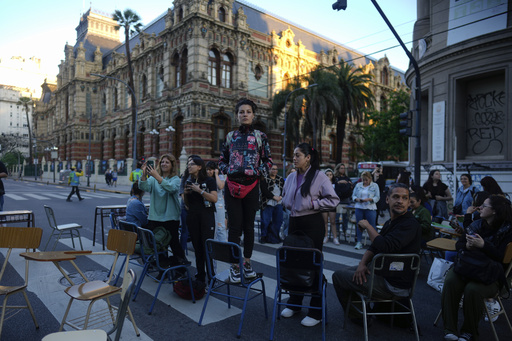
In Buenos Aires, Argentina, President Javier Milei, who has been in power for almost a year, is grappling with the fallout from his aggressive austerity measures aimed at eliminating the country’s substantial deficits. His approach has involved significant cuts to the public workforce, reduction of subsidies, and wage suppression among state employees. Although Milei’s policies were intended to improve the economy, they have resulted in widespread hardship for the populace. With the left-wing opposition fragmented after the economic challenges that Milei inherited, there has not yet been a surge of social unrest, but that may soon change as frustrations grow.
Recently, Milei’s decision to veto a bill intended to increase university funding has sparked significant backlash, particularly among educators and students. Education has long been viewed by Argentines as essential to social equity, and this recent action has led to a series of protests. Open-air classes were held in Plaza de Mayo, a central square that symbolizes the political heart of the nation, signaling the beginning of a fresh wave of demonstrations advocating for public universities. Students are now mobilizing and planning to take over university campuses, escalating the momentum in anticipation of a large protest soon.
The core of the protests revolves around demands from university staff for substantial pay increases due to rampant inflation, which they claim has effectively decreased their purchasing power by 60% this year alone. In response to a significant protest organized by students in April that drew around half a million participants, the government provided some operational funding for universities but neglected to address the urgent need for salary advancements. Consequently, the monthly earnings for associate professors are now approximately $320, while teaching assistants earn just $120.
Milei’s veto of the university funding proposal, which aimed to raise staff salaries to adjust for inflation rates that currently exceed 200%, has been met with strong opposition. Even though recent adjustments to his policies have brought monthly inflation down to below 5%, over 50% of Argentines live in poverty—an alarming figure that underscores the severity of the economic situation. According to the Civil Association for Equality and Justice, the last time public universities faced such severe budget constraints was in 2004.
Individuals within the academic community, such as Nicolas Jose Lavagnino from Conicet—the country’s principal research institution—have expressed concerns over degrading living conditions, as reports indicate that 250 scientists have left due to financial cutbacks. University unions have rejected the government’s proposed 6.8% pay increase, deeming it insufficient. At the University of Buenos Aires, some institutions are warning of mass resignations tied to these belittled salaries.
Despite the mounting discontent, Milei remains resolute in his fiscal discipline. In September, he also vetoed a pension increase that would have cost more than 1% of Argentina’s gross domestic product, citing concerns over budget balance. However, the educational funding bill in question would have amounted to only 0.14% of GDP, raising questions about the underlying motivations for his decision.
Milei has framed his critiques of the university system as a response to what he perceives as leftist indoctrination. While he claims to defend public education, he suggests the necessity of an audit to address potential corruption within these institutions. His administration has recently revived a controversial proposal to charge tuition fees for foreign students, who currently make up nearly 4% of enrolment in public universities.
This move towards greater financial scrutiny comes in a context where some critics cite previous scandals involving mismanagement of funds under former President Cristina Fernández de Kirchner, arguing that calls for transparency are warranted. As the political landscape evolves, following Milei’s narrow legislative victories to uphold his university funding veto, protesters across the spectrum—from far-left activists to center-right citizens—have filled the streets, united against austerity measures that have worsened the economic crisis and intensified poverty.
Prominent voices, such as Santiago Gándara, a professor of social sciences, argue that targeting Argentina’s hallmark of accessible public education may prove to be a strategic miscalculation on Milei’s part. He likens the situation to an assault on the iconic Plaza de Mayo, implying that such a move challenges a treasured national symbol.
The potential for the current protests to escalate into a significant threat against Milei’s leadership remains uncertain. Politicians and analysts alike acknowledge that while immediate danger may not be evident, the cumulative impacts of student mobilization can be unpredictable yet profound.
